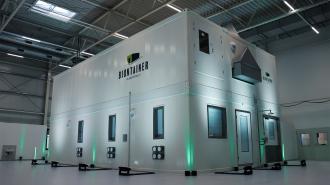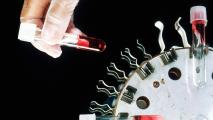German biotech company BioNTech is sending a modular mRNA vaccine factory to Rwanda to allow the country to produce more COVID-19 shots for Africa, in Africa — and perhaps one day help the continent easily vaccinate its citizens against other deadly diseases, too.
The challenge: Africa manufactures less than 1% of the vaccines it uses, relying on other countries for the rest, and when the first COVID-19 vaccines were being made, wealthier countries scooped them up for their own citizens first, leaving Africans behind.
“The COVID-19 pandemic has exposed the need for significantly greater local production of vaccines.”
Tedros Adhanom Ghebreyesus
Even though many African nations are now well-supplied with COVID-19 shots, getting doses from manufacturing sites elsewhere in the world to Africa is a challenge — many shots require a cold chain, and the farther they need to be transported, the greater the chances of that chain breaking.
“The COVID-19 pandemic has exposed the need for significantly greater local production of vaccines and other essential products in all regions of the world, especially in Africa,” said Tedros Adhanom Ghebreyesus, the WHO’s director-general, in 2022.
The idea: To increase vaccine production in Africa, Germany’s BioNTech — the company that designed one of the first mRNA COVID-19 vaccines with Pfizer — announced in February 2022 that it had designed a modular mRNA vaccine factory it dubbed a “BioNTainer.”
This factory consists of two modules, each made from six shipping containers. In the first module, mRNA is produced and purified. In the second, it is made into a vaccine. Local partners can then package the mRNA vaccine into doses.
The mRNA vaccine factory can be shipped via truck, train, or freighter and then assembled on site. It takes up about 8,600 square feet of space, and BioNTech says one factory can produce up to 50 million doses of its mRNA COVID-19 vaccine annually.
BioNTech expects any mRNA vaccines made at the facility to be used within Africa.
What’s new? BioNTech has now finished building its first BioNTainer module in Europe and is preparing to ship it to Kigali, Rwanda, before the end of Q1 2023. It’s not clear when the second module will follow, but production of vaccines is expected to begin one year after it arrives.
BioNTech will staff and run the factory itself at first, but the plan is to transfer the operation to locals to run independently. The company expects any mRNA vaccines made at the facility to be used domestically or exported to other members of the African Union at a not-for-profit price.
Looking ahead: BioNTech’s goal is to set up two BioNtainers in Kigali before shipping others to Senegal and possibly South Africa — and these factories might not be limited to producing COVID-19 shots.
BioNTech is currently developing mRNA vaccines for malaria, tuberculosis, and HIV, and if these shots prove effective, they could be manufactured in the same BioNTainer factories, too, thanks to mRNA vaccines’ unique flexibility.
We’d love to hear from you! If you have a comment about this article or if you have a tip for a future Freethink story, please email us at tips@freethink.com.






